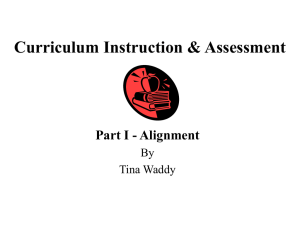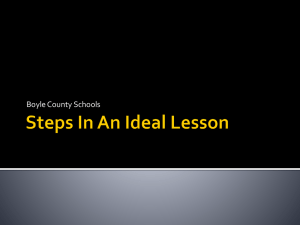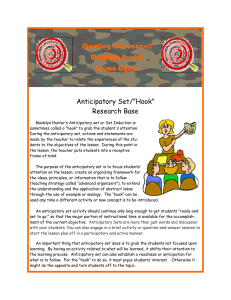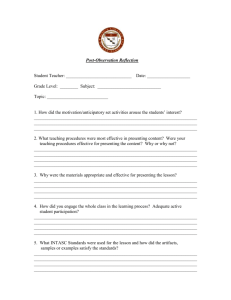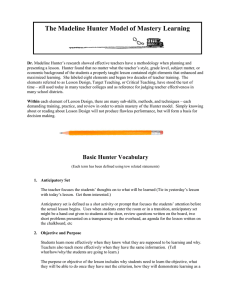Madeline Hunter Lesson Plan Design
advertisement
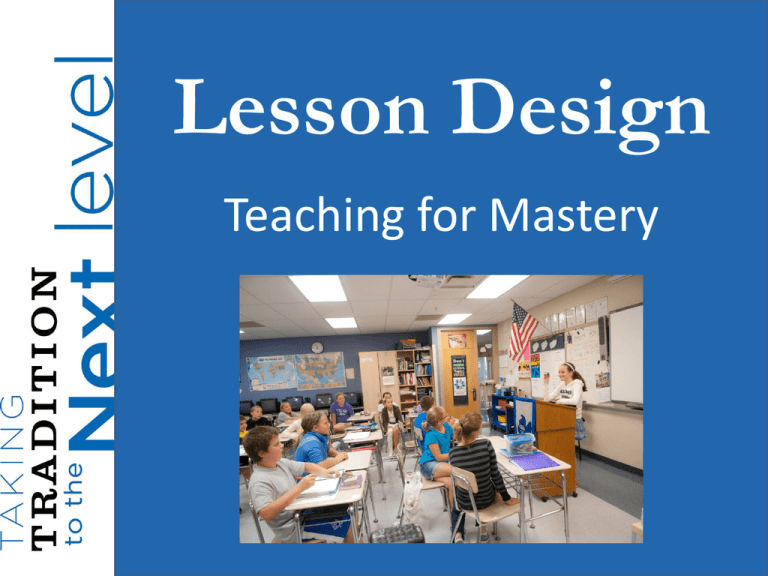
Lesson Design Teaching for Mastery Today’s Learning Target • I can incorporate elements of Madeline Hunter’s model of mastery learning into my lesson plans, as appropriate, to enhance student learning. Madeline Hunter (1916-1994) • Mastery Teaching, 1982 • Teachers are decision-makers -content -teaching behavior/methods (what teachers will do) -learning behavior (how students will learn and how they will let you know that they learned it) Your Hook Think about your most effective teacher ever. What were some things that that teacher did every day in his/her lessons? Think about your least effective teacher. What did this person do in his/her daily lessons? Where does it fit? 1. Unit Development 2. Assessment Development 3. Lesson Design Preparing to Plan A. What do students need • • • B. C. to know? to be able to do? to understand? What activities will the students do to acquire the knowledge skills and understanding? How will students demonstrate knowledge, skills and understanding in applied, real-world contexts? Planning the Lesson • Identify standards, objectives, targets. • Design the assessments: – Summative – Formative • Design activities. • Design practices. Step 1: Review • Typically at the beginning of the lesson • Review previous material that is relevant for this lesson 2. Anticipatory Set (Hook) • • • • • Why learning is needed. Link to prior learning. Interest the student. Provides focus. Must be related to the understanding. Note: Not all bell ringers are anticipatory sets. 2. Anticipatory Set (Hook) Anticipatory Set/”Catch a Sense” Examples: • • • Show an interesting video clip on lightning before beginning a lesson on the effects of weather. Taste a pineapple before having a lesson on the senses. Respond in a journal regarding the importance of democracy before a lesson on the Constitution. 3. Objectives/Learning Targets • Behavioral Objective Students – Bloom verbs (level of learning) • Essential Questions – Relate topic to students’ lives. • “I can…” Statements – Students denote what they know, can do, or understand. Step 4: Instruction/Activities Often Direct Instruction • Presenting new information to students • Demonstrating/Modeling • Note making, not note taking • Interactive lecture • Identifying similarities and differences • Nonlinguistic representation • Cooperative learning – Think, pair, share • Generating and Testing Hypotheses – Students designing and creating • Research and Evaluate Information 4. Instruction/Activities • Students work in groups to complete a graphic organizer on the similarities and differences between the Great Depression and our current economic crisis. • Students draw a graphic representation of democracy. • Students work in groups to design and test the strength of a bridge. • Students participate in reading circles and discuss literary elements of a book. • Students participate in learning centers, rotating to a new activity every 15 minutes. Step 5: Checking for Understanding • Determining whether or not students are making sense of the material as the material is being presented • Another name for thisformative assessment!! • Should be frequent and used to guide instruction Step 6: Guided Practice Break it down and do it together • Takes place immediately after instruction • Students are given the opportunity to practice or apply new learning • Students receive immediate feedback Step 6: Examples Guided Practice Break it down and do it together • • • Each student develops an agreed upon metaphor and shares it with their peers. Students work on math boxes while teacher walks around and gives feedback and corrects errors and misunderstandings. Biology students work on dissecting a frog while the teacher corrects misidentification. Step 7: Closure • Students verbalize key or critical understanding. • Students explain “how and why.” • Students link what they have learned to their lives. • Students show what they learned and know why they learned it “so what?”. Step 7: Examples • Students perform a dance they just learned. • Students create a poster of their key learnings. • Students complete an exit slip at the end of the class. Step 8: Independent Practice Practice is not practice when it is assessed. • Students work on their own • Homework • Not an assessment but students still need feedback Step 8: Independent Practice Examples Practice is not practice when it is assessed. • • • Students complete real world math problems for homework or find examples of geometry shapes throughout the city. Students read a new story and identify the characters’ choices revealing the theme. Students develop a home safety plan for their house. Lesson Cycle • Focus and Motivate 1. 2. 3. • Teach for Understanding 3. 4. • Review Objectives and Learning Targets Anticipation Set (Hook) Instruction/Activities Checking for Understanding Practice and Assess 6. 7. 8. Guided Practice Closure/Transfer Independent Practice Today’s Learning Target • I can incorporate elements of Madeline Hunter’s model of mastery learning into my lesson plans, as appropriate, to enhance student learning. Independent Practice Develop a lesson plan template based on Madeline Hunter’s model. You will use this template to develop the lesson plan for the “lesson” you are going to teach our class. “I believe the future of education is bright! We are beginning to unlock the mystery of the human mind and how it processes and learns. We, now, can enable teachers to use that knowledge to accelerate that learning process. No longer is teaching a ‘laying on of hands.’ It has become a profession that combines science with art to create a better and more productive world for humankind.”—Madeline Hunter
